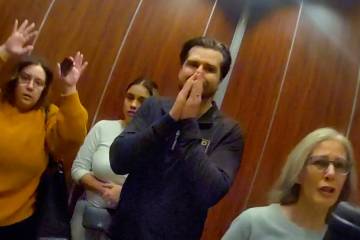More workers showing up on time
Maybe it's fear over job security.
Perhaps it's concern about docked pay.
Or it could be that there's just a lot more work for smaller staffs to handle.
Whatever the reason, fewer employees nationwide are punching in late for work these days, a new study shows, and business owners say they're seeing the same phenomenon locally.
The number of U.S. workers reporting late to work has fallen 25 percent in the recession, dropping from 20 percent in 2008 to 15 percent in 2010, according to a report from Harris Interactive and job-placement website CareerBuilder.com. The study surveyed nearly 2,500 employers and 4,000 workers nationwide in November and December.
"Whether it is a result of fear associated with the economy or just a shift in attitude, workers over the last few years are doing a better job of managing their schedules and getting into the office at the designated time," said Rosemary Haefner, vice president of human resources for CareerBuilder.
Las Vegas restaurateur Jeff Klein puts it more simply: "There seems to be less drama in people's lives these days."
Klein, who co-owns CREATE Burgers and Frozen Custard on Lake Mead Boulevard and several area Capriotti's Sandwich Shops, said his company's employees are definitely on time for work more often today than they were in 2008. On top of seeing fewer late punch-ins now, tales of car trouble or late car pool partners have grown rarer. Klein said his employees also ask less frequently for an hour off here and there to head to the doctor's office, indulge in spring fever or, in one unusual case, to "wait for the Breathalyzer to drop below 0.10."
"I think people are more cognizant of the economy, and they're more worried in general about their job today than they were three years ago," Klein said. "People are paying attention."
The sour economy also seems to have captured the attention of workers at Classic Landscapes in Las Vegas: The decline in tardiness at the landscaping-service company is so stark that executives discussed the topic in a Wednesday staff meeting.
At Classic, the day begins at 7:30 a.m., when workers roll out of the shop yard in trucks loaded with mowing and pruning equipment. A shift launch that used to take an hour and a half, with employees not actually checking out for work until as late as 9, now takes 22 minutes, said Melissa Mills, Classic's vice president. These days, workers just linger less and get out in the field faster.
Classic's new general manager did reorganize the equipment room in the fall, but that alone can't account for the sizable drop in late shift starts, Mills said. The plummet in late starts began before the general manager came on board, and the 90-employee business has seen unusual declines in employee turnover. That drop-off in staff departures, combined with the drastic improvement in shift starts, indicates that the economy lies behind a good portion of the gain in punctuality, she said.
"I'd like to think we're just doing a better job of managing our employees, but I think the reality is, a lot of mom-and-pop (landscape-service) companies have gone under, and a lot of larger landscaping companies have had to cut back," Mills said. "There aren't a lot of places for these workers to go. The jobs just aren't there. I think they're trying to hang on to what they've got until they can see what happens down the road."
But the boost in on-time performance begs the question: Is fear the best workplace motivator?
"I don't think it's ever a positive thing for employees to feel scared," said Karen Durkin, a business coach and principal in the local accounting firm Houldsworth, Russo & Co. "Nothing about that would be productive or positive. To me, it's a sense of lack of trust."
There are alternatives to letting worry reign in the workplace.
Any effective strategy to encourage punctuality starts with clearly established performance goals, Durkin said. Employers should make sure they have an up-to-date employee handbook, and that they plainly set expectations for all staffers. Managers should also ask employees to sign statements saying they understand workplace policies.
Such direct goal-setting may have made a difference at Classic Landscapes.
For starters, the company's new management set specific standards on getting prepped for shifts. Plus, workers have earned positive reinforcement, including company updates on how pleased management is with the change in timeliness, as well as gift cards and barbecues when workers meet customer-service and maintenance goals. That softer approach works best, Mills said, because unhappy employees can "make or break a business on the service they provide."
"We never want to crack the whip to force them out of the yard," she said. "We just asked, 'What do we need to do to motivate them?' As jobs got tighter, people started to see more oversight, and their performance naturally corrected itself. We didn't have to set ultimatums."
CREATE's approach also combines well-defined policies with an understanding approach.
Klein said he's never fired anyone for being late. But managers do maintain a specific protocol to prod tardy workers back into line: A late employee gets a verbal warning the first time . The second occasion draws a written admonition. The third time brings a suspension, and then it would "escalate from there," Klein said.
"We're understanding. Everybody has problems occasionally," Klein said. "We try to take a customer-service approach. We tell them, 'When you're late, the customer suffers.' "
Nor has CIM Marketing Partners in Las Vegas had to knuckle down to get workers in the office on time.
Tyler Coonts, a creative-account coordinator at CIM, said tardiness has never been a serious problem at the advertising agency, but these days in particular, punctuality is especially popular.
"In today's economy, you do what you have to do," Coonts said. "My colleagues and the people I know in my industry want to do anything they can to make themselves stand out and do the absolute best we can. And I don't think that's a bad thing. This economy has shown people how customer service should be, so when it comes to what time you get to work, you want to be prompt, and you want to go the extra mile to make sure you're doing not just what the client expects but above and beyond that."
Contact reporter Jennifer Robison at jrobison @reviewjournal.com or 702-380-4512.
LATE WORKERS SAY THE DARNDESST THINGS
Hiring managers on the most outrageous excuses they've heard for workplace tardiness:
• Employee said his hair was hurting his head.
• Employee said her karma wasn't in sync that day.
• Employee claimed he hurt himself taking a fork out of the dishwasher.
• Employee said he wasn't late, but the company clock was wrong.
• Employee claimed a hive of bees had taken over his car.
• Employee said her cat attacked her.
• Employee cited a delay in public transportation and produced a note signed by "The Bus Driver."
• Employee claimed his Botox treatment took longer than expected.
• Employee said he knew he was running late, so he figured he'd get doughnuts for the rest of the staff.
ON-TIME PROGRESS
The share of U.S. workers reporting late for work at least once a week has fallen in the recession:
Year, Percent late
2008, 20 percent
2009, 16 percent
2010, 15 percent
Source: CareerBuilder.com




























